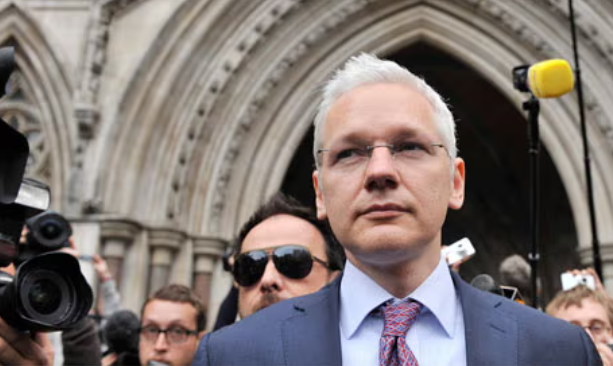
A UK High Court hearing to determine whether Julian Assange will be allowed a final appeal against his extradition to the United States concluded with no immediate decision, leaving the fate of the WikiLeaks publisher hanging in the balance. With Assange too unwell to attend the hearing himself, Reporters Without Borders (RSF) reiterates its calls for his urgent release.
The two-day hearing on 20 and 21 February was presided over by judges Dame Victoria Sharp and Mr Justice Johnson, who heard Assange’s defence team argue why the extradition should be blocked, and lawyers for the US government present their arguments in response. The hearing concluded with the judges reserving their decision; they gave no indication of when it might come, other than setting some internal deadlines for lawyers to provide additional information – the last of which was 4 March.
For the first time since January 2021, Assange was granted permission to attend the hearing in person or to connect from Belmarsh Prison via video link, but his lawyers said he was too unwell to do either. RSF remains concerned for Assange’s health following our last visit to him in Belmarsh on 16 January, during which he was suffering from a respiratory illness and had broken a rib from excessive coughing.
“We heard nothing new from the US government during this hearing – they simply doubled down on their long-standing arguments that this case is not about journalism and that Assange would be given a fair trial in the United States. But this case very much is about journalism and press freedom, and with no First Amendment protection and no public interest defence in the Espionage Act, Assange cannot receive a fair trial. While we still hope for some form of justice to be delivered in the UK, we continue our call on the US government to find a political solution to bring the case to a close and allow for Assange’s release without further delay”, said Rebecca Vincent, Director of Campaigns.
Assange’s defence lawyers presented their final grounds for appeal, including their argument that the political nature of Assange’s actions mean a political offence exemption should apply and present a legal bar to his extradition. They argued that his prosecution would represent a grave violation of freedom of speech, and that he would not be given a fair trial in the United States. They pointed to alarming reports of CIA officials planning Assange’s possible rendition or assassination, and expressed serious concern that, post extradition, the charges against Assange could be modified to allow for the possibility of the death penalty.
The US government responded by repeating its longstanding arguments about the case, emphasising that the bulk nature of the disclosures and the publication of names of implicated individuals meant that Assange’s actions went beyond the ordinary practices of journalism. They held him responsible for the unredacted dataset ending up in the public domain, even though other parties published it before WikiLeaks following a password disclosure by one of the media partners WikiLeaks worked with. They also attempted to dispute the defence’s argument that Assange, as a foreign national, would not be given First Amendment protections, despite the US prosecutor himself having said this could be the case.
RSF representatives attended the hearing in court, having been properly accredited as NGO observers for the first time in four years of monitoring the extradition proceedings. In the main courtroom, RSF and other observers were able to fully follow proceedings; however, journalists in an overflow courtroom experienced extensive difficulties in doing their jobs due to connection issues to the live feed. The court resolved these problems on the second day of the hearing. Unlike previous hearings, remote access was only granted to journalists and observers physically present in England and Wales, leaving others disappointed – particularly in the US and Australia, where journalists’ union the MEAA engaged in advocacy efforts to attempt to resolve the issue for its members.
The UK is ranked 26th, and the US is ranked 45th out of 180 countries in RSF’s 2023 World Press Freedom Index.
Cource: RSF
Photo: Andy Rain/EPA



